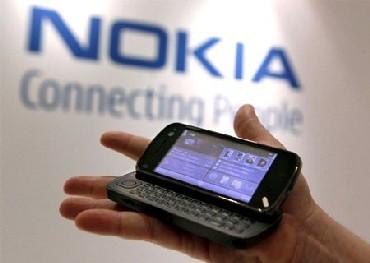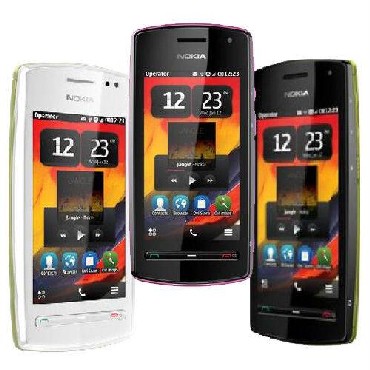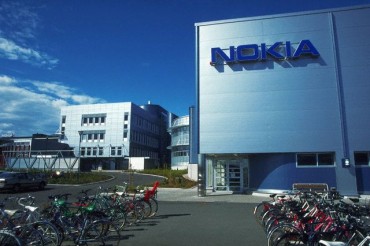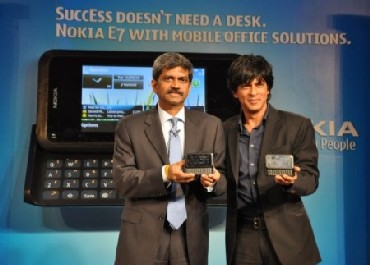Photographs: Reuters Priyanka Joshi in Mumbai
Its market share has been falling, but Nokia is fighting back with budget smart phones. At the heart of the brand's latest initiative is Near Field communication (NFC) technology – a wireless connectivity technology that enables convenient short-range communication between electronic devices.
Beginning with three handsets that support NFC, Nokia is giving free content (music, images, games, videos etc) from the forthcoming film Ra.One, which stars Nokia's brand ambassador Shah rukh Khan.
Nearly 400 Nokia priority stores will sport film posters with NFC chips which when tapped with NFC-enabled Nokia handsets will download Ra.One content on to the devices.
...
How Nokia is trying to make a comeback in India
Image: Nokia 600D Shivakumar, the newly promoted head for Nokia's India, West Asia and Africa business, says Nokia is betting on NFC as an emerging mobile entertainment medium. "Post Ra.One, we will continue to distribute free content to users using the ecosystem that we have created for NFC," says Shivakumar.
But the operative word is affordability. NFC-chips are easy to manufacture – with their cost being under Rs 50 and can be re-programmed easily to distribute new content every time, says Shivakumar. Late last month, Nokia launched three of these phones. While the Nokia 600 is priced at Rs 12,999, the Nokia 700 is at Rs 18,099, and Nokia 701 at Rs 18,999.
Nokia, which commands about 30 per cent market share in India, is also hoping to sell NFC accessories like headsets and music speakers.
...
How Nokia is trying to make a comeback in India
NFC makes it easier to connect your mobile device with NFC-enabled wireless speakers or headphones, so you can come home from a run with your headphones on, for example, and simply tap your home speakers with your NFC music player for the music to continue uninterrupted into your home.
It's pretty easy to imagine the host of new consumer electronics applications and devices that could develop along these lines, says Shivakumar.
NFC-enabled phones are part of the series of many firsts for the handset maker this year. It also launched the first dual-SIM handsets in its portfolio, then introduced quick updates to its Symbian platform in an attempt to reduce the gap with Google Android and Apple's iOS, and has now begun to focus on affordable Symbian smart phones.
To compete with the onslaught from Apple iPhone and high-end Android devices, Nokia has also said it will license the Windows Phone 7 operation system for future Nokia smartphones.
...
How Nokia is trying to make a comeback in India
Image: Nokia's strategy of budget smart phones has found many takersWhile Shivakumar didn't comment on the arrival of the first Windows smart phones, sources in company confirm that the first Nokia smart phone running on Windows platform will hit Indian stores in December this year.
Nokia's strategy of budget smart phones has found many takers. According to Strategy Analytics, the bulk of new mobile users in India over the next five years will be low-income consumers, particularly in rural areas.
"Affordable mobile phones with an appealing set of features will be the key to success in this market," says Rahul Gupta, of Strategy Analytics (India).
Shivakumar is also getting ready to upgrade the feature phone users in India to Symbian smart phones.
...
How Nokia is trying to make a comeback in India
Image: D Shivakumar of Nokia India with Shahrukh Khan at the launch of Nokia's dual SIM phones"The dual-SIM market where Nokia had no presence had become half of the handset market, value wise. I call it Nokia's innovation and distribution agility that the brand now has five dual SIM devices in the last three months," he says.
Realising that Nokia had to differentiate its dual-SIM from the clutter, it doled up the device form-factor and placed the second SIM slot on the side, enabling the user to swap secondary SIM card with ease.
Shivakumar, who by early next year, will move to Dubai and head more than 90 countries, is confident that Nokia will not lose any more market share in smart phones. "The smart phone market was about six million units last year and is growing the fastest. With a slew of upgraded Symbian Belle smartphones, I can say that we are better than competition and priced affordably. There's no way that we will lag."
Nokia-watchers hope he will walk the talk.







article